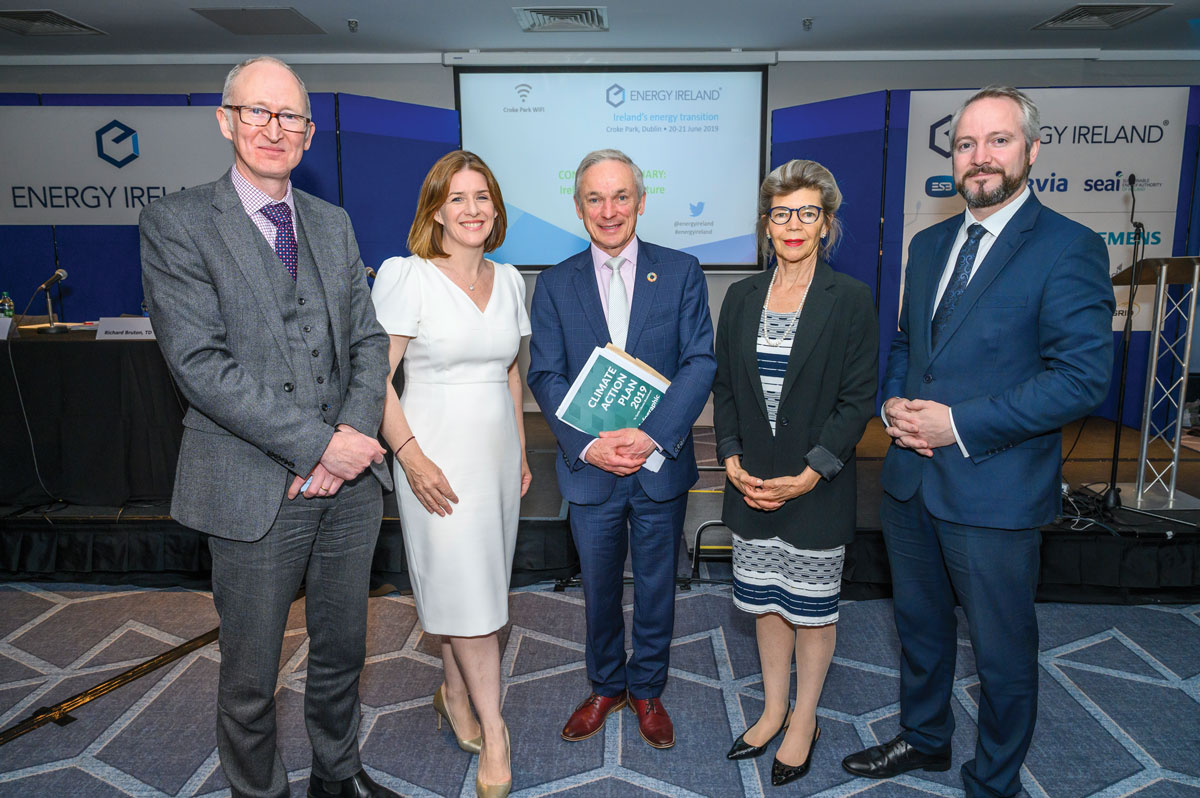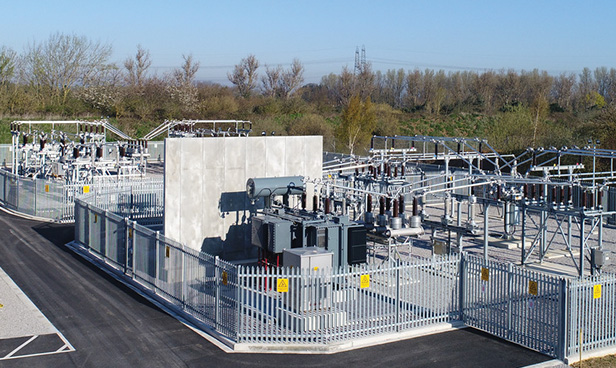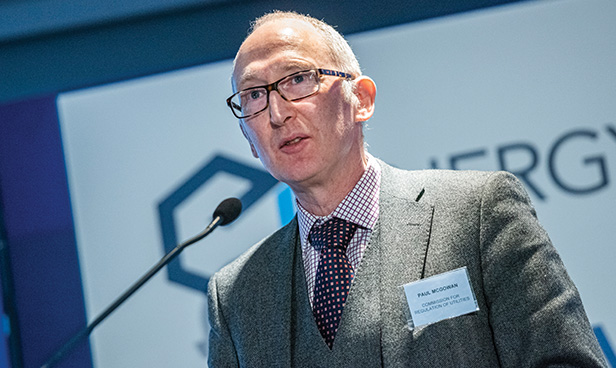
Energy Ireland 2019
25th November 2019
Smith Brother: Two decades in business
25th November 2019Regulating a low carbon economy

Paul McGowan, Chair of the Commission for Regulation of Utilities (CRU), discusses the challenge of determining who, in the future, pays to maintain Ireland’s electricity grid and associated distribution network.
It is now universally accepted that Ireland will join the growing list of countries around the world where individual houses and smaller communities actually become micro generators of electricity and will seek to sell this energy on their respective national grids. The continuing uptake of new solar technologies is making this happen.
“Currently the vast majority of Irish consumers are using the grid to source all of their electricity requirements,” says McGowan. “However, what happens when they become electricity generators in their own right? In such instances they may only need to use the grid for a small proportion of their electricity. The question then becomes: ‘how do we create tariffs for these people compared with those who continue to use the grid for most if not all their electricity requirements?’”
The Chair of the CRU outlines his belief that proper regulation will be critical in delivering a carbon free future for Ireland. “CRU’s mission remains that of protecting the public interest, where water, energy and energy safety are concerned,” he says.
“Our vision is to ensure that energy is supplied safely and that there is a sustainable, reliable and efficient future for water in Ireland. CRU has also been empowered to ensure that customers pay reasonable prices and to help secure a low carbon future for Ireland.”
Discussing the CRU’s strategic plan, covering the period 2019 to 2021, McGowan outlines how this obligates the organisation to deliver sustainable low-carbon solutions with well-regulated markets and networks.
“It also empowers CRU to develop effective communications to support customers and the regulatory process,” he adds.
Where low carbon energy systems are concerned, it will be the role of CRU to ensure utility network policies and infrastructure development deliver the future that everyone wants to see evolving. The organisation has also been set the objective of delivering market policies that support a low carbon future whilst still supporting competitiveness and security supply.
“The outworking of all this will be an enduring policy that supports climate change targets,” McGowan explains.
“We will also see gas from renewable sources introduced to the network, thereby increasing its contribution to the decarbonisation of Ireland’s electricity market and we will see the introduction of market design and regulatory instruments to support 2030 and future climate change targets.”
McGowan confirms that CRU is constantly putting the climate change agenda at the heart of its strategy, adding: “We must support renewables. The same principle holds, where micro generation is concerned. Facilitating the development and adoption of new technologies is also crucial, as we look to the future. Improving energy efficiency levels is a priority for the country as a whole.
“Consumers must also be fully informed in term of their options, both as users of electricity but also producers of this same resource.”
McGowan stresses the role of the regulator, when it comes to delivering on all of these matters: “CRU must communicate coherently on the role of the regulator. The fundamental questions to be addressed are: ‘Who are we and what do we do?’”
The CRU Chair explains that delivering a low carbon future will, in part, entail the production of gas from renewable sources. He specifically recognises the role of agriculture in this regard. He confirms the need to make optimal use of the gas distribution infrastructure that is already in place.
“CRU must act to support competitiveness and security of energy supply,” he continues. “Climate Change is the key challenge of our time but CRU will pay its part in delivering a low carbon future.”
McGowan states that CRU must adopt the correct regulatory models: “We all need to adapt to changing circumstances. CRU needs to find the right balance between agility and regulatory certainty but there is also a fundamental requirement to ensure that, whatever happens, the independence of the regulator is maintained in full.”
The Chair confirms that the National Smart Metering programme will help to empower consumers: “We need to bring the energy consumer with us on this journey,” he explains. “Smart metering is a key enabler in making sure this will happen. It can support micro generation and encourage better insulation.”
He foresees a new generation of active electricity consumers developing in Ireland. They will be technology hungry and he foresees a key role for CRU in allowing this to happen.
“In its role as regulator, CRU needs to become more agile. A principles-based approach to regulation will be required for the future.”
“Citizen energy communities will help structure the debate on how the energy conversation in Ireland evolves. Consumer rights must be protected while these new energy communities take hold across Ireland. In the meantime, I do not to see the development of an urban: rural split, where energy is concerned.
“In its role as regulator, CRU needs to become more agile. A principles-based approach to regulation will be required for the future.”
Commenting on energy markets, McGowan says that the Single Electricity Market (SEM) is starting to work well. He adds: “Day ahead markets are now an integral part of the analytic mix. Flows on SEM are now more intuitive, with day ahead markets impacted by the level of wind compared to demand. The SEM market must be made to work but balancing the market is crucial.”
Looking to the future, the CRU Chair explains that the implementation phase of DS3 is nearing completion and confirms that future wholesale market design in Ireland must support renewables in tandem with flexible demand and storage.
“We must also make efficient use of interconnectors,” he explains. “We must also make what we have already in place work.”
With regard to Ireland’s Enduring Connection Policy (ECP), McGowan says that offers will be issued shortly, facilitating the generation of 2,174MW of electricity.
“Stakeholder consultation on ECP2 will be necessary. The next batch of ECP offers can be expected by mid-2020,” he confirms. “ECP must act to deliver full energy policy alignment. This will take account of climate targets plus a full alignment with the Renewable Electricity Support Scheme. It must also enable communities to become generators of electricity in their own right.”
McGowan stresses that Ireland can’t electrify everything when it comes to meeting the country’s future energy needs.
“Gas will be important within the future scheme of things,” he explains. “The potential impact of the new EU gas regime on Ireland must be fully assessed. The first biogas is on to the network but we want to see more of it. Carbon capture and storage will also play a key role in allowing Ireland to meet its climate change obligations. We also need to think about the introduction of dynamic network tariffs.”
Where Brexit is concerned, McGowan stress the need for SEM to be maintained, whatever the outcome of the negotiations between London and Brussels.
“Brexit illustrates the relevance of CRU’s core function,” he outlines. “The transition to a low carbon system must take place. It will be part of CRU’s role to ensure this transition takes place in the most cost-effective way possible.”
